Our workcamps
The One World Association – SCI Poland organised 334 workcamps together with its Partners, among them:
PL-SCI ŻABIKOWO
Workcamps in Żabików organised in cooperation with the Museum in Chełmno nad Nerem (a branch of the Martyrological Museum in Żabików). During the workcamps in Żabików, volunteers conserved and documented tombstones from the former Jewish cemetery (matzevot), organised an exhibition in the Museum in Chełmno, and carried out various cleaning works on the camp site. An important element of these workcamps is the study part, which deals with the history of the camp in Żabików and Chelmno/Ner, Jewish culture, genocide today, peace and human rights.
PL-SCI WHERE HISTORY MEETS NATURE (GLUCHOLAZY)
The volunteers were hosted by the Benevolens Foundation, which is primarily concerned with environmental protection and the promotion of ecology. Its activities also include charity work and the protection and promotion of culture, art and heritage. The organisation’s headquarters are located in the historic Spa Park in Głuchołazy, not far from the Czech border. The aim of the workcamp was to help the Benevolens Foundation with cleaning work in the Historic Spa Park in Głuchołazy, as well as learning about the culture of the Opawskie Mountains region. The work consisted of tidying up the park where the foundation’s building is located. It included painting benches, pulling weeds and weeding, cleaning up withered leaves and branches, cutting wood and replanting plants. The study part was related to learning about the history and nature of Głuchołazy and the Oprawskie Mountains. However, the most interesting part of the study part was a meeting with a group of chiropterologists and a lecture on bats. The project received funding from the European Solidarity Corps.
PL-SCI MAJDANEK (Lublin)
Workcamps organised in cooperation with the State Museum at Majdanek. Polish-German youths took part in workcamps at Majdanek. Thanks to funding from the Polish-German Foundation, volunteers from both countries have a chance to work together on the grounds of the Museum, undertaking conservation and cleaning works and helping in the Museum archives. The study part of the project is about the history of the camp, the Holocaust, Polish-German relations after World War II, peace and human rights.
PL-SCI RADWANOWICE (near Krakow)
Workcamp organised in cooperation with the Brother Albert Foundation in a centre for people with disabilities. The Foundation cares for people with motor and intellectual disabilities by running social homes (residential care), as well as integrated schools, workshops and rehabilitation camps. The aim of the workcamp was to integrate the residents of the centre with the international volunteers, to organise art workshops, to prepare an exhibition of drawings and photographs together with the residents and to help them with their daily tasks. During the study part of the workcamp, the volunteers had the opportunity to learn about the history of the Brother Albert Foundation and the subject of intellectual disabilities and their work and education.
PL-SCI CENTRE FOR FOREIGNERS (Linin near Warsaw)
Workcamps in refugee centres are organised thanks to your donation of 1 % of your tax. Their aim is to bring the energy and spirit of international solidarity into the daily lives of the families staying there. Work at the workcamps in Linin consisted of organising games, artistic activities and sports events for the children and young people of the centre. The study part was devoted to the topic of refugees in Poland and the world.
PL-SCI POZNAŃ SUMMER SCHOOL
The workcamp took place at Poznań’s Secondary Technical School Complex in Debec. Volunteers convinced the young people to actively learn English. During these two weeks, the young people from Dębiec had the chance to learn more about the culture and customs of the countries they came from. The volunteers proposed a number of different activities, including: a debate on international volunteering, practical workshops on first aid, a whole host of games, both urban, board and sports. After work, the volunteers had the opportunity to get to know Poznan from the inside out. They learned about the virtues of Poznan’s cuisine and experienced the match atmosphere by cheering on the Poznan Lokomotiv at Bulgarska Street. The workcamp was sponsored by the Red Park company.
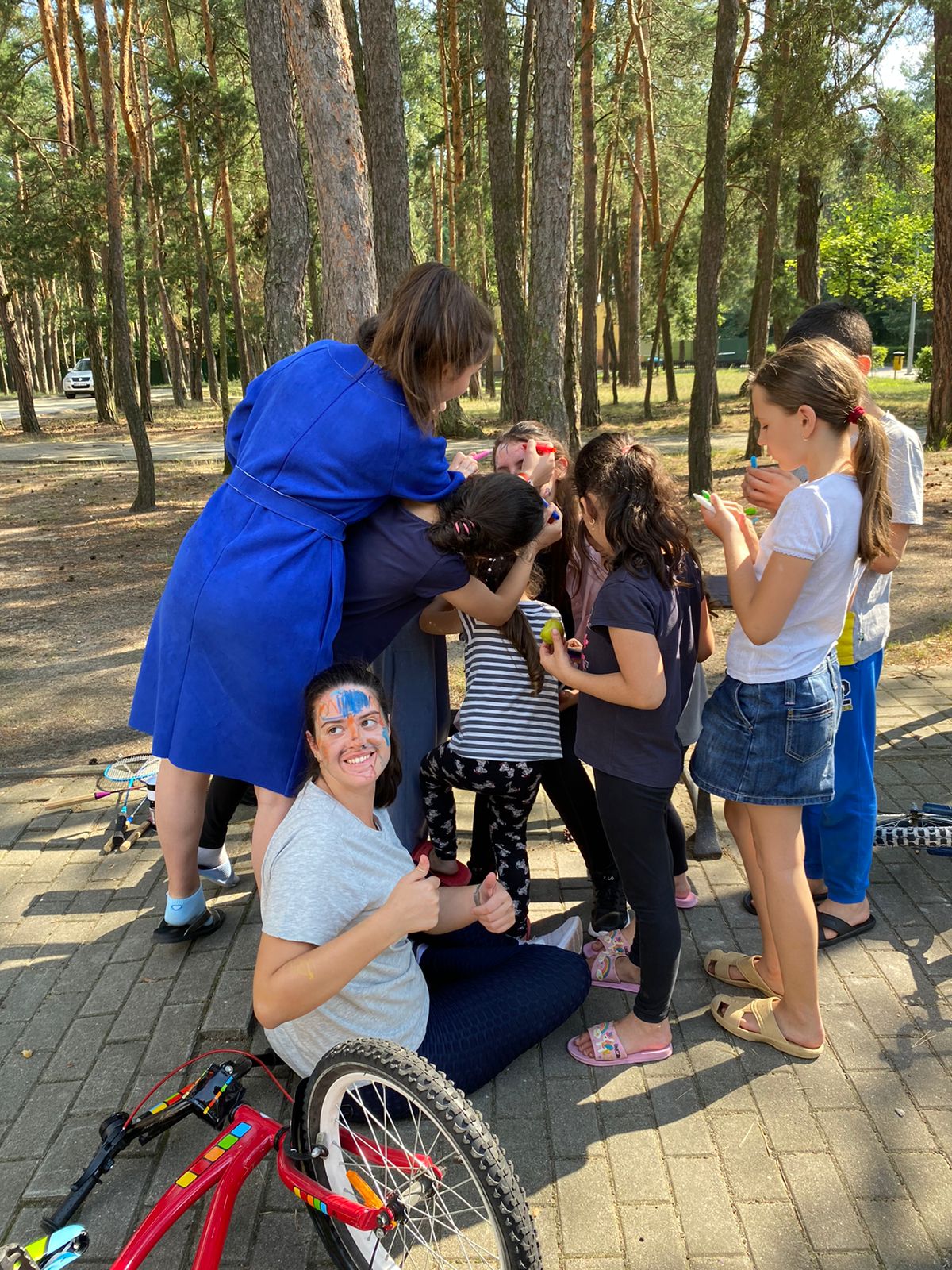
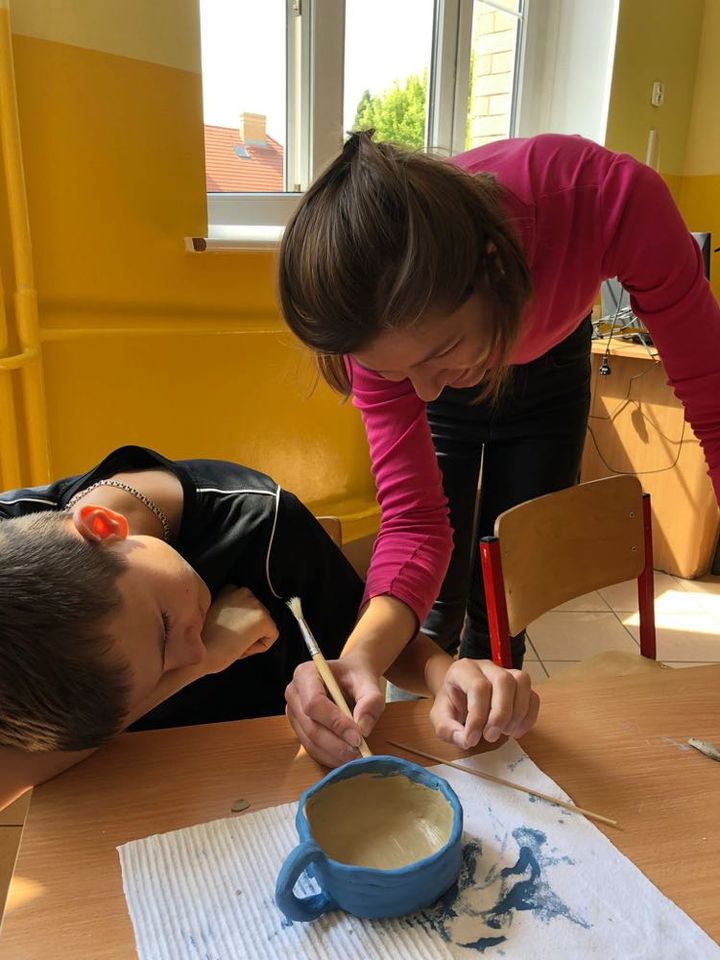
PL-SCI INTERNATIONAL WORKSHOPS (PETRYKOZY near Warsaw)
Workcamp organised in cooperation with the Informal Group of Artists and Animators and the Żabia Wola Municipality. The project took place on the grounds of a 19th century open-air museum, where volunteers organised intercultural workshops for children and young people from Petrykoz and nearby villages. The volunteers conducted original workshops on a variety of topics. They also prepared a short performance presenting the culture of their countries. During the study part, the volunteers had the opportunity to learn about the methodology of the workshops and the topic of intercultural dialogue.
PL-SCI GREEN SPACE (near Szczecinek)
The workcamp was organised in cooperation with the ‘Green Space’ Association, which works to preserve the traditional character of the village where the project took place and the environment. During the workcamp organised there, volunteers helped to build the Association’s new office in an old barn, which is to serve as a centre for workshop and environmental activities to serve the local community.
PL-SCI NEMOLAND (near Jelenia Góra)
Workcamps organised in cooperation with the Nemo Foundation in the Giant Mountains, on the border with Germany and the Czech Republic. This is an international centre that aims to promote and develop the region through conservation projects, cultural preservation and promotion, and environmental events. Volunteers constructed and decorated the cultural centre of the Nemo legend during the workcamp.
PL-SCI CENTRE FOR FOREIGNERS (Kolonia Horbów, near Biała Podlaska)
In 2009, one of our workcamps took place for the first time in Kolonia Horbów/Zales near Biała Podlaska. The volunteers’ work consisted of organising games, artistic activities and sports events for children and young people from the centre for foreigners in Kolonia Horbów and for the youngest residents of the area, including students from the School Complex in Zalesie. The study part of the project focused on refugee issues in Poland and around the world.
PL-SCI BOM (Poznań)
Polish-German-Czech workcamp. The Poznań BOM Theatre Group and the parish of Our Lady of Consolation jointly organised a theatrical half-camp for children under the care of Caritas in Poznań Podolany. Our Lady of Consolation parish, jointly organised a theatrical half-camp for children under the care of the Caritas organisation in Podolany, Poznań. Workshops, games and theatre rehearsals resulted in a performance based on one of the episodes of “The Enchanted Pencil”, a famous fairy tale for children in Poland. In addition to their work, the volunteers had the opportunity to enjoy the cultural attractions in which the city of Poznań abounded at the time (concerts, dance shows, DanceBox, cafe charm, a bike trip and a bonfire).
PL-SCI KORZECZNIK (near Konin)
A workcamp was organised in Korzecznik in cooperation with the local primary school and the association ‘With Education into the Future’, which operates at this educational institution. The main task was to run a “half-camp” for children from Korzecznik and the surrounding area and to prepare the artistic part of the festival, which took place during the workcamp. During the festivities, joint dances, competitions for the audience, song singing and a puppet show were prepared together with the children.
PL-SCI POGÓRZE PRZEMYSKIE (near Przemyśl)
Workcamp organised in cooperation with the Natural Heritage Foundation. The project took place in Kalwaria Pacławska, a small village near Przemyśl. In this globally unique area, there has been a struggle for years to create the Turnicki National Park. The activities of the volunteers helped to také another step in this direction. They were engaged in̨ inventorying insect species associated with primary forests. During the course of the project, the participants managed to supplement the data they collected with further locations of protected insect species, so that the finished report was handed over to forestry representatives. Together with members of the Polish Tourist Country-Lovers’ Association (PTTK), volunteers also marked a section of the hiking trail leading to the sanctuary. Project funded by the Polish-German Youth Cooperation.
PL-SCI BIAŁY BÓR (near Koszalin)
Biały Bór is situated in the West Pomeranian Voivodeship and has a population of around 2,500, of which around half are of Ukrainian nationality – the result of mass resettlements that affected representatives of many nationalities (Poles, Ukrainians or Germans) during and after the Second World War. The volunteers’ task was to involve the local community in the preparation (and later in the participation) of a mini Polish-Ukrainian festival, which took place on 14 August 2010. The festival consisted of performances and happenings, presented jointly by the volunteers and the residents of Bialy Bor. The study part involved talking about how the cataclysm of total war affected the fate of the individual, about the right to have one’s “small homeland” and about the expulsions and forced displacements that swept across Europe in the 20th century.
PL-SCI Dębak
Workcamp carried out in cooperation with the Centre for Foreigners in Dębak. The volunteers’ task was to organise free time for both children and adults staying at the Centre. One of the activities they proposed was joint language learning: Polish and English with a touch of Spanish. In addition, there were daily games, sports activities and spending time together. All this made the children forget about the overwhelming reality, at least for a while. The volunteers had the opportunity to get to know the profiles of the refugees, their problems, but also to learn̨ about the cultural aspects of the regions they came from. Their stay in Dębak ended with a competition in which each of the children, but also the adults, could present́ something characteristic of their region of origin; so there were African and Chechen dances, as well as origami demonstrations and singing.
PL-SCI Piątek
Workcamp organised in cooperation with the Municipality of Piątek. The aim of the project was to organise free time for a group of rural children aged 8-13 who were not going on holiday. It provided them with a window on the world and the only opportunity to meet people from different cultures. Volunteers came to the geometric centre of Poland (i.e. to Piątek) to sharé their passions and skills. They also had the opportunitý to come into contact with Polish folk culture during a “Wicker open-air workshop”, which took placę at the Maciejaks’ agro-tourism farm. It included, among other things, workshops on wicker weaving, clay moulding and making Łowicz cut-outs. Volunteers also experienced̨ what life is like in a farming area by participating in several organised excursions. Workcamp funded by the One World Association – SCI Poland and the Municipality of Piątek.
PL-SCI MONAR GAUDYNKI (near Ełk)
The One World Association – SCI Poland has been working with Monar in Gaudynki for 15 years. Monar is the largest Polish non-governmental organisation dealing mainly with drug addicts and HIV-infected people. The centre in Gaudynki mainly houses the first group. Its residents work, live and take part in group therapy. The main task of the volunteers is to integrate into the community by working together (gardening, cleaning, kitchen work, renovation) and participating in leisure time activities. The volunteers also went on a camping trip to the lakes area together with the residents of the centre.
PL-SCI MONAR LIPIANKA (koło Ostrołęki)
The ‘Monar’ centre in Lipianka deals mainly with drug addicts and is situated in a charming location by the Narew river in central-eastern Poland. The centre has about 30 patients aged 20-30, who work, live and take part in group therapy together. The main task of the volunteers was to integrate into the community by helping them in their daily work (gardening, cleaning, kitchen work, renovation, etc.) and taking part in leisure time activities. The study part dealt with the problem of drug addiction and drug therapy.
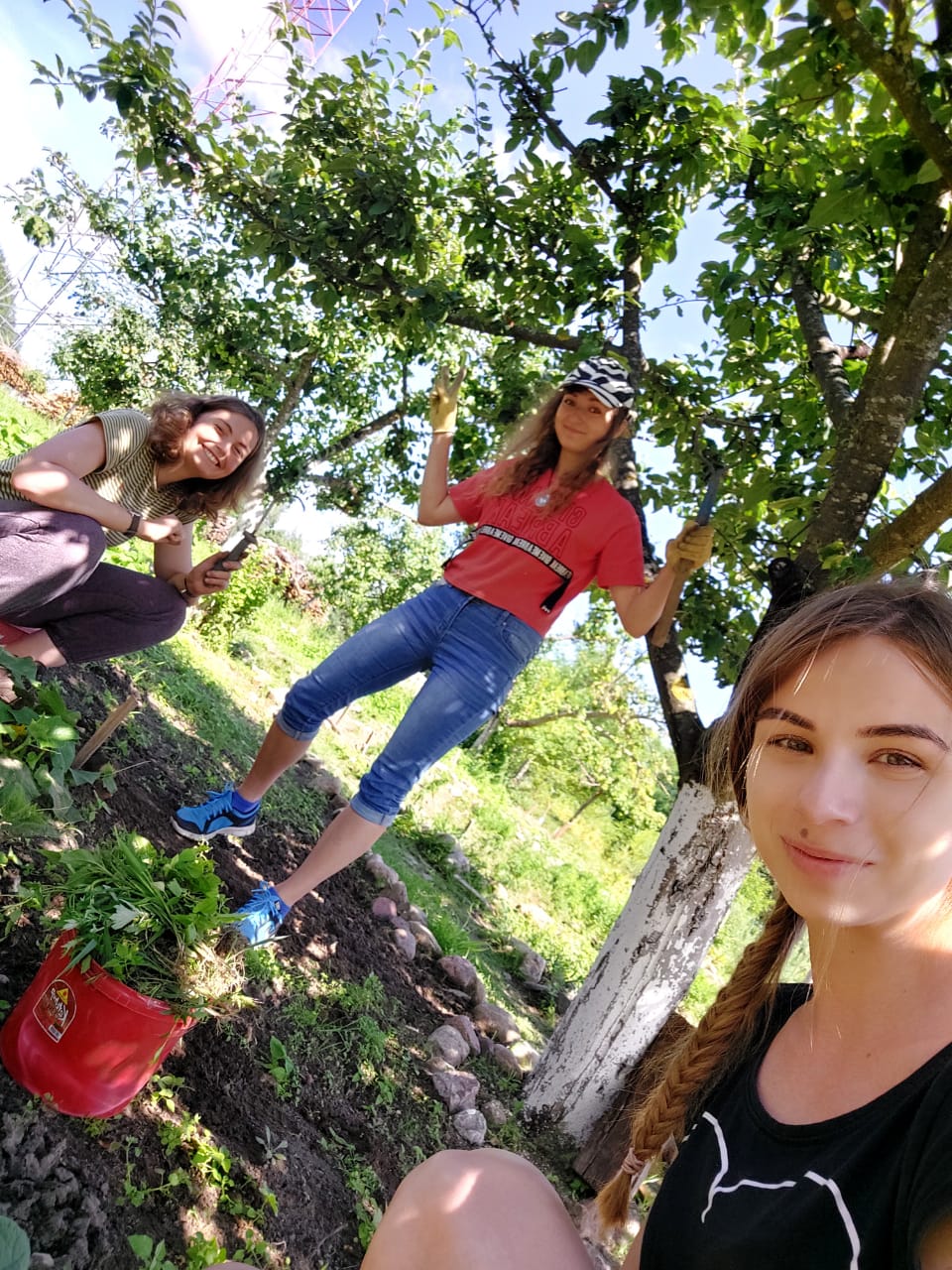
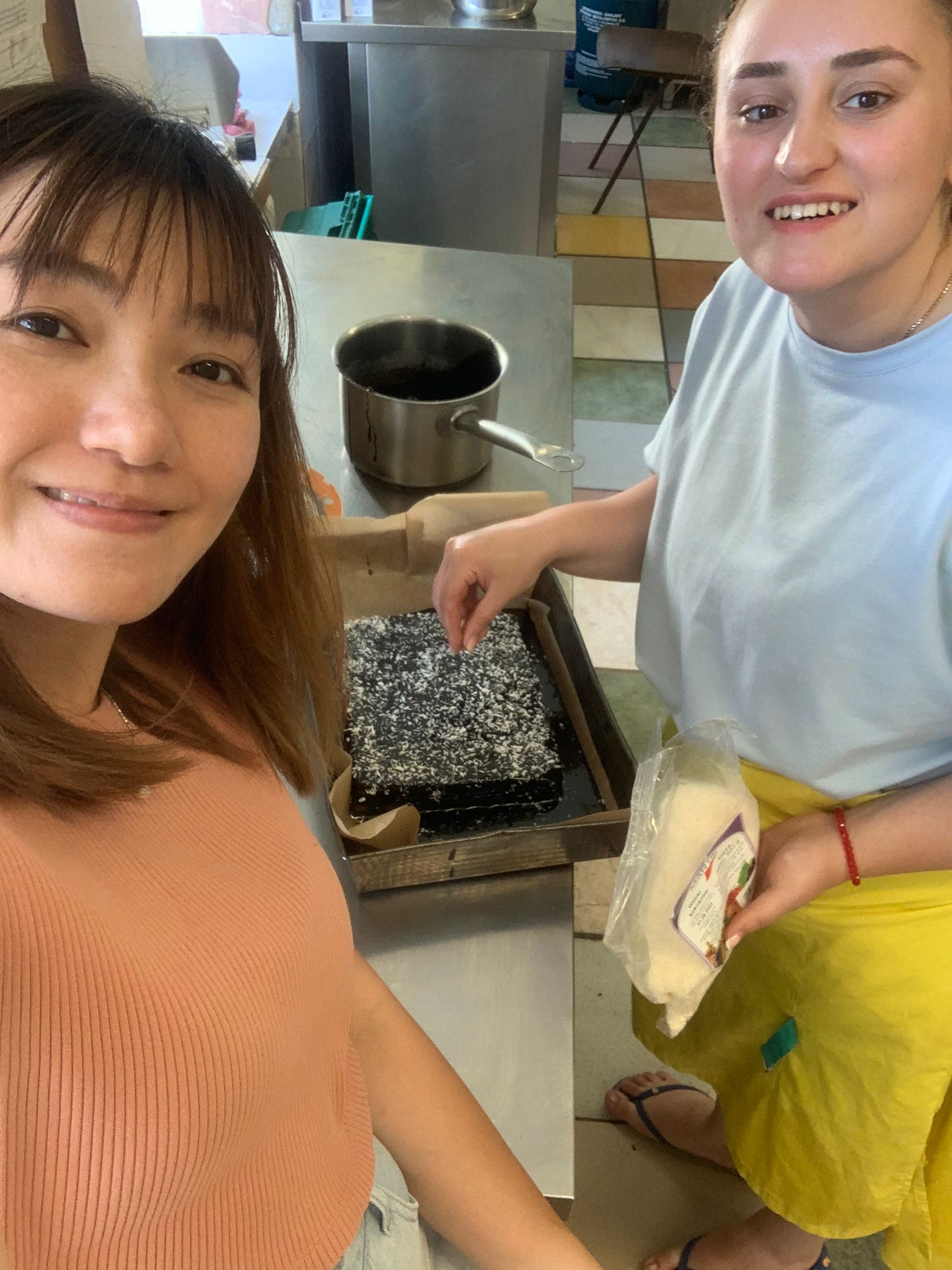
PL-SCI Górki Wielkie
Workcamp organised in cooperation with the Zofia Kossak Foundation. Thanks to the workcamp, Artistic Summer at Kossak’s, organised by the Zofia Kossak Foundation in Górki Wielkie, received support from a group of volunteers from all over the world. During the Fourth International Sculptors’ Plein-Air, volunteers who came to the workcamp carried out various works in the surroundings of the Cultural and Art Centre “Dwór Kossaków”. After work, the volunteers went to bathé themselves̨ in the Brennica River, and in the evenings, together with the sculptors and local pupils and students, they organised dinners and games together. Thanks to the volunteers who came to the workcamp and the sculptors from Italy, the Czech Republic and Slovakia, the Koss chalet was transformed̨ into a festival of many cultures.
PL-SCI My creative holidays (Poznań)
Workcamp organised in cooperation with Primary School No. 7 in Poznan. The workcamp ‘My Creative Holiday’ at Primary School No. 7 in Poznań was organised for school children who stayed at home during the summer. These were activities of an artistic and sporting nature. They were led by a talented and enthusiastic international̨ group of volunteers. The aim of the activitieś was to creatively organise leisure time, show cultural differences and similarities, activate the local community and learn foreign languages.
PL-SCI Marianow I i II
The annual workcamps in Marianovo (up to 2 in one year) are the result of the popularity of the activities organised by the volunteers. Children come in large numbers and eagerly engage in sports activities as well as arts and crafts. The works created during them: baskets, earrings, pastel, wax and chalk paintings decorate every exhibition̨ held at the end of the activitieś with folk artists and volunteers. Workcamp participants, after working with children, have a chance to visit́ Warsaw̨ and test́ their fitness and concentration during climbing boxes of original activities in which the organisation is specialised̨ by the “AXA” Association. Workcamps carried out with the financial support of the AXA Association.
PL-SCI Stargard Szczeciński
Workcamp organised in cooperation with the Children’s Home in Stargard Szczeciński. The aim of the workcamp was to creatively organise holiday time for the young residents of the orphanage. The mornings were devoted to the youngest children (4-7 years old), and the afternoons to older children (7-16 years old), for whom there were prepared, among other things, ecological workshops, recycling activities, games and plays. Every other daý our volunteers introduced the children to their country of origin. As part of a presentation about Poland, the children prepared Polish songs for the volunteers, learning̨ difficult words, and making as many as 300 pierogi together! In addition, the local association “Centrum Otwarte Drzwi” organised a treasure hunt around Stargard for the children and volunteers. Another additional attraction was a workshop on birds, prepared by Stargard ecologists, or a joint trip to Szczecin. In their free time, the volunteers conquered their fears in a rope park, took sea baths in Świnoujście, went for walks on nearby Lake Miedwie and enjoyed the Woodstock festival.
PL-SCI Unia Izerska
Workcamp organised in cooperation with the Jizera Union Association and the Wolimierz station. The project in the Czech-Polish border area aimed, among other things, at the process of revitalising the historic trail, which was interrupted for political reasons after the Second World War. The volunteers’ task was to build a cycle path on the old railway embankment of the former Jizera Railway, which significantly facilitated contact and joint activities between active inhabitants of the border villages. The pace of the work meant that the ceremonial opening of the path at the border took place before the end of the workcamp. In addition to working together, intercultural dialogue developed during excursions to local tourist attractions and evenings devoted to learning about other cultures.
PL-SCI MICHAŁOWICE near Warsaw
The workcamp took place in Opacz (Michałowice municipality near Warsaw). Volunteers supported a group of local educators and joined in organising activities for a group of children who took part in a day camp organised by the Municipal Social Assistance Centre in Michałowice. The activities were attended by 30 children from the commune of Michalowice aged 6-15, who were under the care of the local GOPS. For many, playing together and having daily contact with volunteers was a real “window on the world”. The children had the opportunity to learn about the cultures and customs of the countries and regions from which the volunteers came. After work, the volunteers were able to enjoy the rich cultural offer of the capital to their heart’s content. Walks around Warsaw’s Old Town, a visit to Łazienki Park, the Museum of Modern Art or the Warsaw Rising Museum allowed the volunteers to learn about Poland’s complex history and culture.
PL-SCI POZNAŃ
The workcamp took place at Middle School No. 63 in Poznań. From Monday to Friday, volunteers conducted classes with young people in English. Their aim was to encourage young people to speak a foreign language, to overcome the barrier of shyness and to become more self-confident. At the same time, participants learnt about different cultures and about each other through games, plays and dances. In the afternoons the volunteers went for long walks and explored the local area. There were also encounters with traditional cuisine. The workcamp was organised in cooperation with the Poznan Gymnasium No. 63 and thanks to the following sponsors: Auchan, Biedronka, Biuro Promocji Miasta, Chata Polska, Cukiernia, Makro, Pizzeria Da Luigi, Multikino and the school shop.
PL-SCI STĘSZEW near Poznań
Volunteers shared their energy during the town game and the municipal harvest festival, during which they organised games and activities for children and young people. In addition, each of the foreign guests had the opportunity to play the role of a teacher and conduct language workshops, which brought much satisfaction and joy not only to the volunteers, but also to the inhabitants of Stęszew and its surroundings. Everyone who participated now knows the Cyrillic alphabet and basic expressions in the guest languages, knows what the smallest region in Spain is, and can sing a song in Basque. The workcamp was realised with the financial support of Stęszew Municipality.
PL-SCI INTEGRATION OF POLISH AND ROMA CHILDREN
The aim of the workcamp at the “Stokrotka” Integration Support Centre for Children and Young People was to support educators in their daily care and organisation of activities for children who are wards of the Social Welfare Centre. This is one of the few centres in Poland that successfully integrates Polish and Roma children. Together they organised various games, sports games and art workshops for the children. Outings to the swimming pool and museums as part of the “Summer in the City Programme” were an opportunity for the children to spend their holidays in an interesting way, learn about different cultures and learn languages.
PL-SCI KRASOCIN near Kielcy
During the workcamp in Krasocin, with the support of local female teachers, volunteers shared their passions and skills with their charges. Volunteers had the opportunity to get in touch with Polish folk culture during a pierogi-making workshop with the ladies of the Rural Housewives’ Circle, a visit to a local dairy and hospitality in local homes, as well as numerous historical and sightseeing excursions. The workcamp was co-financed by the Municipality of Krasocin and organized in cooperation with the Krasocin branch of the Włoszczowa Historical Society.
PL-SCI MONAR MARIANÓWEK – EDUCATIONAL WORKSHOPS (near Kolobrzeg)
There are about 50-60 patients aged 15-25 at the “Monar” center in Marianowek, who work, live and participate in group therapy together. An important place in the therapy of the residents of Marianówek is the opportunity to develop their passions and interests, hence the opportunity to participate in various activities. The main task of the volunteers was to integrate with the residents of the center by participating in their daily tasks and preparing artistic, educational, recreational workshops for/for the residents of the center.
PL-SCI MONAR WYSZKÓW
Together with the patients, the volunteers carried out daily chores, from cleaning (the house and the area around the centre) and cooking to working with the horses at the centre’s stables and renovating the hostel where people who have completed therapy live. The stay was filled with a whole host of activities and attractions, from daily work to participation in organised integrative sports activities and bonfires. In order to make the most of their time together, they organised national days of all the countries. On a given day, they ate regional dishes, watched presentations about the respective country, played traditional games and learned national dances. In addition, they also went on a camping trip by the river, where they canoed, had bonfires, danced, and played stealth games.
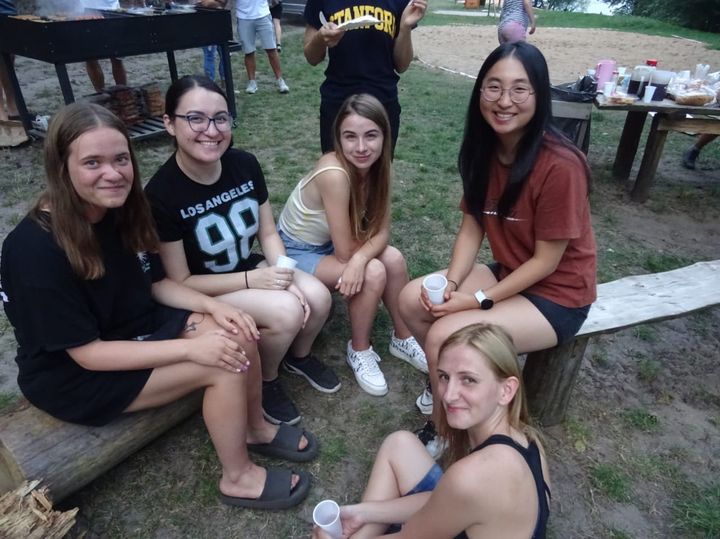
PL-SCI MUZEUM KULMHOF, CHEŁMNO NAD NEREM
The Kulmhof Museum is a branch of the Martyrological Museum in Żabików, with which our Association has cooperated for many years. It is located on the site of the former German extermination camp in Chełmno nad Nerem. This camp was the first centre for the mass, immediate extermination of Jews in the Wartheland. The primary duties of the volunteers included the initial cleaning of archaeological artefacts (mainly personal items of the victims) stored in the Museum, their initial conservation and preservation, the cleaning of the museum area, and the cleaning of the lapidarium (consisting of Jewish tombstones). During the project, volunteers managed to clean more than 1,000 artefacts.
PL-SCI RURAL COMMUNITY CENTERS IN DŁUGOSIODŁO
The workcamp took place in the charming village of Długosiodło, near Warsaw. Volunteers visited village day centres, organising language, art and sports activities for local children. The volunteers travelled around the commune on bicycles! The workcamp was organised in cooperation with the Traditionally Modern for Villages Association.
PL-SCI MUZEUM KULMHOF, CHEŁMNO NAD NEREM
The Kulmhof Museum is a branch of the Martyrological Museum in Żabików, with which our Association has cooperated for many years. It is located on the site of the former German extermination camp in Chełmno nad Nerem. This camp was the first centre for the mass, immediate extermination of Jews in the Wartheland. The primary duties of the volunteers included the initial cleaning of archaeological artefacts (mainly personal items of the victims) stored in the Museum, their initial conservation and preservation, the cleaning of the museum area, and the cleaning of the lapidarium (consisting of Jewish tombstones). During the project, volunteers managed to clean more than 1,000 artefacts.
PL-SCI RURAL COMMUNITY CENTERS IN DŁUGOSIODŁO
The workcamp took place in the charming village of Długosiodło, near Warsaw. Volunteers visited village day centres, organising language, art and sports activities for local children. The volunteers travelled around the commune on bicycles! The workcamp was organised in cooperation with the Traditionally Modern for Villages Association.
PL-SCI EAGLES OF POLISH WILDERNESS, POGÓRZE PRZEMYSKIE
During this workcamp, a group of volunteers were busy observing and locating birds’ nests in the area of the Przemyskie Foothills, where the Natural Heritage Foundation has been trying for years to establish the Turnicki National Park.
PL-SCI ANIMALS OF POLISH WILDERNESS, POGÓRZE PRZEMYSKIE
During the workcamp, a group of nine volunteers were involved in identifying rodents in the area of the Przemyskie Foothills, where the Natural Heritage Foundation has been trying for years to establish the Turnicki National Park.
PL-SCI HISTORICAL CEMETERY, BIELSKO-BIAŁA
Volunteers carried out cleaning work in the old historic Evangelical cemetery and undertook activities to promote the ‘Gardens of Remembrance’ project (https://www.facebook.com/ogrody.pamieci). Volunteers had the opportunity to learn about the multicultural character of the city of Bielsko-Biala. The project was implemented by the Committee for Saving the Old Evangelical Cemetery operating at the Evangelical-Augsburg Parish in Bielsko.
PL-SCI GET INSPIRED IN WĄGROWIEC
The project was organised in cooperation with the mayor of Wągrowiec and the local Municipal Public Library. The volunteers’ task was to run activities for children from primary schools in Wągrowiec to spend an interesting and creative summer holiday. There were art workshops, board games, sports activities, activities at the Forest Education Centre of the Durowo Forest District and much more.
PL-SCI RESTORARTION! near JELENJA GÓRA
Workcamp organised in collaboration with the h/2 Foundation. volunteers carried out renovations, cleaning and gardening work at the Red Manor, a baroque house that is the centre of the Foundation’s creative residences. In practice, this meant forging cement and cleaning the walls; installing the electrical system; sanding the wooden elements of the balcony, windows, balustrade; oiling the wooden bed frames; building a stone path; cleaning the garage; chopping and stacking wood. During free time, the dining room was transformed into a film room in the evenings. One of the volunteers prepared a lecture on neorealism in Italian cinema, and a bonfire was organised. Several evenings were devoted to the studio section. There was also time for games – jenga, taboo, cards against humanity. One of the additional attractions was also a trip to the nearby palace in Wojanow.
PL-SCI JEWISH HERITAGE, WARSAW
For over a week, an international group of volunteers with the help of Poznan scouts cleaned up the historic Jewish Cemetery on Okopowa Street in Warsaw. The organiser of the project, the Cultural Heritage Foundation, has been carrying out work at this unique necropolis for the past three years together with volunteers from Warsaw. This year, together with our Association, it was decided to extend an invitation to volunteers from abroad. The organisers have planned discussion meetings, lectures and thematic walks related to the forgotten Jewish culture in Warsaw, as well as visits to the POLIN museum or the Warsaw synagogue. The cemetery is largely undiscovered, with access to many of the cemetery’s plots obstructed by wild vegetation. Nearly 3 hectares of the cemetery have been successfully cleaned up.

